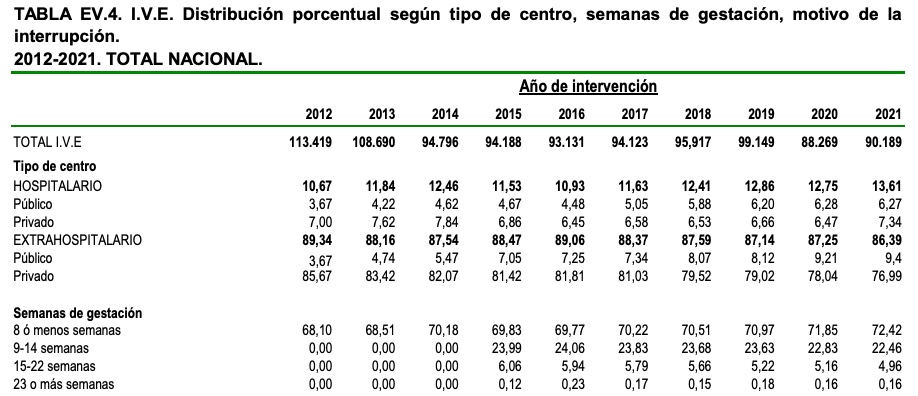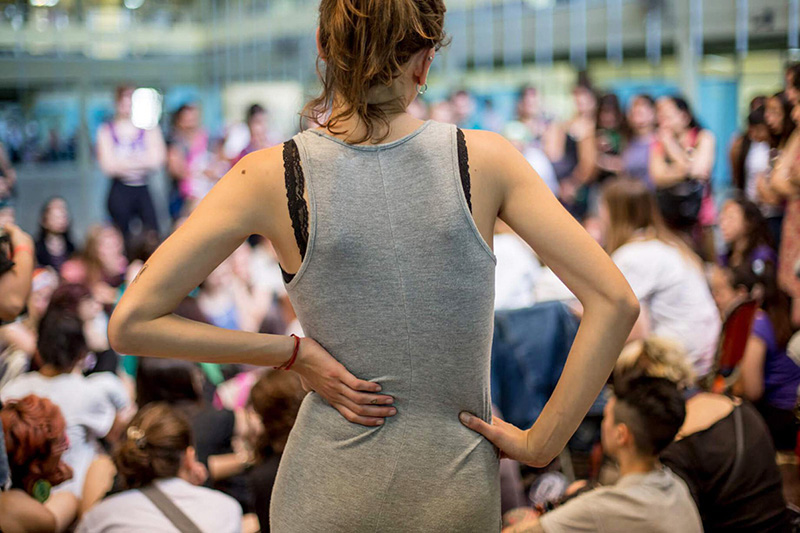Let us not respond to the neocon attack on abortion with moral or moralising arguments. It is a right, and there is no need to justify it. Just expand it and defend it.
By Vanesa Jiménez/ctxt
Abortion is a woman’s right. Control over our bodies – and our fertility and reproduction – is an inalienable part of our dignity as persons, and is part of human rights. And yet free, legal and safe abortion has yet to be won or is under constant threat. Here and almost everywhere else in the world. We have seen both sides in recent years. In June 2022, not long after Argentinean women finally saw their right to abortion recognised after years of intense feminist struggle, the US Supreme Court overturned the ‘Roe v. Wade’ doctrine that made abortion constitutional in 1973. In just six months, 13 of the country’s 50 states banned this right.
In the Spain of 2023, abortion is back on the front pages of newspapers and opening the news. This is nothing new. The more or less latent battle of ultra-conservative social movements is weakening in the face of regulations that expand women’s rights. It already happened with Zapatero’s government’s law on time limits in 2010, which despite its limitations eliminated the three cases – rape, risk to the physical and mental health of the mother and malformation of the foetus – of the first law that – at least in part – stopped considering abortion a crime, that of González in 1985. And it is happening again now, with the new law of the coalition government, which restores rights curtailed by Rajoy’s reform in 2015 and extends others.
The novelty is that the ultras are in the institutions and their neocon offensive against women is gaining prominence: it is one of the staples of the extreme right of the world and of groups of all stripes.
So here we are, once again defending the right to abortion, convinced that if during Rajoy’s legislature we managed to water down the Gallardón law and oust the Minister of Justice who gave it its name – that of “free maternity makes women authentically women” – now, with the ultras as necessary partners, the fight will be tougher. Castilla y León is the example. Because they not only want to take away a right, they also want to impose their framework, one that considers us irresponsible, promiscuous, incapable. Behind the moving ultrasound scans and foetal heartbeats redolent of the Women’s Section and NODO, of Poland and Hungary, is just that: to make it clear to us that we need tutelage, because we women do everything lightly. So much so that, as I read in El País, in a report published as I write this article, on 28 December the three Vox senators presented in the upper house a proposal to veto the new law on sexual and reproductive health and termination of pregnancy to prevent women from having an abortion without the man/father. The ultra party criticises “the fact that the father is not recognised as having any involvement in the decision that could lead to…”. Let me not finish the sentence.
Within the ultra, and apparently not so ultra – seven high-ranking PP officials form part of the leadership of Familia y Dignidad Humana, a foundation that rejects abortion even in the case of rape, and which is headed by the popular senator for Cantabria, Javier Puente – there is also the idea of individual failure associated with abortion. The idea is repeated. If you are raped, maybe you were wearing your skirt too short, or you were in the wrong place, or you gave the wrong signals, or you had been drinking. If you are raped, you should be locked up at home and punished. If you have an abortion, the responsibility is yours, because you shouldn’t have got pregnant, and you decided wrong, and you are not strong. And you should also lock yourself at home to cry. In this framework, which points to us as guilty, is where in many cases our defence of abortion falls down, because we justify ourselves with moral and moralising arguments, and our right suddenly seems like a second-class right.
Many women who in recent days have defended the right to abortion, progressive women, have used phrases such as “it is one of the most difficult moments of a life”. Words such as tragedy, drama, anguish have accompanied allegations that hide a guilt that does not belong to us. Abortion is a right and should not be justified. It is neither good nor bad in itself. And its whys and wherefores are not relevant to the defence of the right.
There are women who live that moment with pain and there are others who do not. And the latter are not worse people, nor worse women. Sometimes there are dramatic stories behind an abortion, stories of poverty or mistreatment. But many other times there are not. There are only women who decide not to become mothers because it is their right to do so.
There are many failures and tragedies related to women in this country. Like the slavery lived by the thousands of women who pick strawberries in Huelva, many of them Moroccans hired at source for the season, who endure exploitation, racism and sexual abuse. Or like the drama of the thousands of other women who work as chambermaids, their hands and bodies broken from making beds and cleaning on a piece-rate basis. Or like the thousands of invisible women who take care of other people in the shadows of the system. Or like the many women who, from the margins, are the only adult in 83% of single-parent households in Spain (53.3% of these families are at risk of exclusion or poverty, compared to 27.9% overall). Or like the women who suffer from male violence. Or like the women who are murdered….
These women do not matter. The fake pro-lifers have very little preoccupation with our lives. The more fragile we are, the less preoccupied they are. Women, LGTBIQ people, migrants… We only exist for their culture wars.
On the issue of abortion our response must be forceful, because after so many years it is still a very precarious right in Spain: we cannot have an abortion in public hospitals. Look at the table published by the Ministry of Health with the latest data on the number of voluntary terminations of pregnancies in 2021. 85.5% of abortions are still carried out in private facilities through agreements with the public health system (in 2011, private centres carried out more than 96%). By the way, it would be nice if the Ministry would stop detailing the reasons for termination of pregnancy. What do we care?

In recent years, thanks to the feminist wave that has brought tens of thousands of people in its wake, we have talked about many things, including our sexual freedom. We have reflected on pleasure, less than we would have liked, because a framework of danger has been imposed on us. We have reclaimed our desire and our full control of our will. We have denounced the passive conception of women’s sexuality as a pillar of male violence. Now it is our turn to defend abortion. And to do so, it is essential that we put aside moral arguments. Above all, abortion is a woman’s right. A fundamental one. And that is why it is always at risk. Let us not wrap abortion in layers of regret or guilt. Let us not spill out into the trap.






